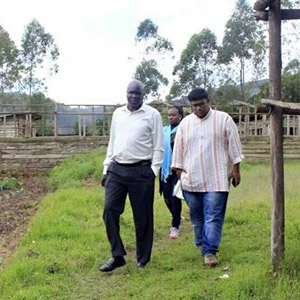South-to-East Africa Collaboration Creates Opportunities

It wasn’t easy, but Sudesh Sivarasu finally got to that rabbit farm in Kabale, Uganda.
This ‘rabbits for protein’ farm was one of the innovative programs of the Kigezi Healthcare Foundation (KIHEFO). And Sivarasu, an instructor in the Northwestern master’s in global health (MSGH) program, had wanted to work with the organization since meeting its founder and director, Dr. Anguyo Geofrey, at an SPS faculty meeting. Several conversations later—and a three-hour ride over Africa’s roughest terrain—he began his collaborative tour.
KIHEFO’s self-sustaining rabbit farms
“I was fascinated by how the rabbits for protein project was both sustainable and self-administered,” said Sivarasu. The KIHEFO rabbit project involves raising the animals as a lean, organic protein source for communities in Kabale. While the fertile land offers plenty of fresh fruit and vegetables, anemia remains a stubborn problem. Other agricultural solutions would require a more costly, non-indigenous agricultural infrastructure, including fertilization and equipment.
“Cages are made of plentiful local eucalyptus trees, the rabbits eat whatever grows in the field, they can be sold in the markets, and they breed … like rabbits,” Sivarasu said. “It checks all the boxes for a model of what works.”
Sivarasu teaches the MSGH course in global health and technology from his base in Cape Town, South Africa. Like many MSGH instructors, he’s highly active in his field: He also teaches Biomedical Engineering at the University of Cape Town and is an award-winning biotech entrepreneur with specialized expertise in health technologies for low-resource settings.
And this is why the KIHEFO organization caught his eye — their programs are well matched to an environment that has little support.
“There are many factors to consider when designing for the third world,” he said. “There may be constant power shutdowns or extreme temperature fluctuation and humidity that devices or other tech can’t handle. A global health program has to work within the culture, with what’s available, and without costing more.”
Making at-home maternity kits better
KIHEFO’s pregnancy kits are another example of effectively matching a project to a local need. Uganda’s challenging geography means poor roads and no public transportation, so many women give birth at home or on the way to a distant hospital. The kit includes a sterile blade, disposable gloves, plastic sheeting and instructions to help make these deliveries cleaner, easier and safer. Also included is wrapping so that when newborns are immediately handed to their fathers—a Ugandan custom—they do not come into contact with dirt or bacteria.
As part of his time spent touring KIHEFO’s maternity clinics with Dr. Geofrey, Sivarasu brainstormed with students and members of the Biomedical Engineering Society of South Africa (a group he leads) about how to make the kits more effective.
“The kit was critical for improving the delivery, but it didn’t help mainstream mothers into hospitals or clinics for subsequent vaccinations,” he said. “We developed a voucher system for the kit that lets patients receive food or supplies in exchange for lifesaving gynecologic and pediatric care.”
A powerful practicum experience
Sivarasu believes ongoing collaboration with KIHEFO could change the local healthcare landscape and open up new practicum possibilities for MSGH students.
“There will absolutely be opportunities,” he says. “We could explore a hybrid situation where the student lives in Cape Town but visits KIHEFO’s sites. It’s a highly challenging region, but it offers an incredible opportunity for seeing what models actually make a difference.”
Mary Brennan, MSGH Program Director, believes the connection between Sivarasu and KIHEFO’s Dr. Geofrey typifies the MSGH approach to learning.
“Our program looks past borders and boundaries to bring experienced practitioners together,” Brennan said. “It can have a far-reaching impact on communities while taking our students beyond textbook case studies.”
